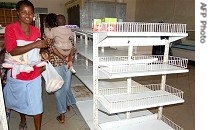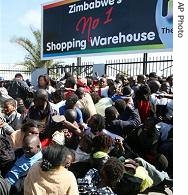2007年VOA标准英语-Arrests of Zimbabwean Businessmen Continue(在线收听)
Harare
12 July 2007
Zimbabwe's few surviving manufacturers servicing the retail sector are starting to close down or reduce their work week even further as the economy dramatically contracts. Peta Thornycroft reports for VOA that shops are emptying, urban commuters are stranded, and businessmen are being arrested in the face of the most dramatic financial collapse in Zimbabwe's history.
Willard Zireva is the chief executive officer of one of Zimbabwe's most famous and enduring brands, OK Bazaars. He was arrested Tuesday on 41 counts of violating the government-ordered price freeze in the company's supermarkets.
The government has frozen prices at the June 18 level, when nearly 5,000 percent inflation caused price increases every two or three days.
About 2,000 businessmen, from chief executive officers to small one-man traders, have been arrested in the past 10 days on charges of violating the price freeze.
 |
| Zimbabwean shoppers walk past empty shelves in Mabvuku, Harare 04 Jul 2007 |
Commuter buses have stopped running because their fares have been cut in half and owners say they cannot afford to operate any longer.
Fuel is scarce in Zimbabwe, because the price has been cut to less than half of what it costs to import.
Now, some manufacturers, already working short weeks and suffering from loss of production because of long electricity shut downs, have begun to close.
An industrialist from Bulawayo, Eddie Cross, said he has shut his clothing factory for a week to see whether the situation changes. He said the controlled prices are between 20 to 50 percent of the cost of manufacture.
The government has also withdrawn licenses from scores of privately owned butchers, and says only the state's bankrupt Cold Storage Commission may slaughter animals.
 |
| A stampede as hundreds of people thronged a shopping warehouse in Harare, 12 Jul 2007 |
There are many eyewitness reports that senior members of the ruling ZANU-PF and the security forces have been the main beneficiaries of reduced prices and have bought in bulk from supermarkets.
According to lawyer Jonathan Samkange, who has represented many of the arrested businessmen, the government has not passed a price control law. He also says he does not know how many people are still detained in connection with the crackdown.
The government said Wednesday, again without legislation to back it up, that profit margins for manufacturers, wholesalers and retailers will be restricted to between five and 10 percent.
Police Superintendent Oliver Mandikapa says he is sending officers to rural areas to monitor small traders' prices.
The ongoing crackdown is enforced by State Security Minister Didymus Mutasa. The government says it is trying to stop profiteering by unpatriotic businessmen, who are accused of sabotaging the economy.
The political and economic crisis began in 2000 when President Robert Mugabe began seizing white-owned commercial farms that produced about 40 percent of Zimbabwe's foreign currency.
This led to rising inflation and shortages of agricultural supplies because the new farmers, many of them President Mugabe's colleagues, did not know how to farm on a commercial scale. Most of the land they were given is not used.